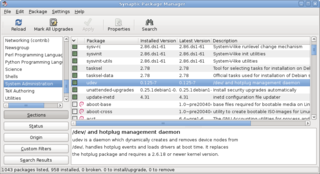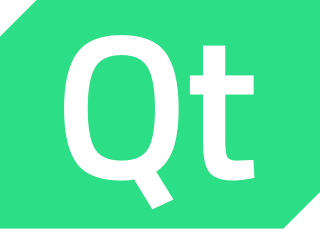
A Linux distribution is an operating system that includes the Linux kernel for its kernel functionality. Although the name does not imply product distribution per se, a distro, if distributed on its own, is often obtained via a website intended specifically for the purpose. Distros have been designed for a wide variety of systems ranging from personal computers to servers and from embedded devices to supercomputers.

A package manager or package-management system is a collection of software tools that automates the process of installing, upgrading, configuring, and removing computer programs for a computer in a consistent manner.
In computing, cross-platform software is computer software that is designed to work in several computing platforms. Some cross-platform software requires a separate build for each platform, but some can be directly run on any platform without special preparation, being written in an interpreted language or compiled to portable bytecode for which the interpreters or run-time packages are common or standard components of all supported platforms.
In software development, Make is a command-line interface software tool that performs actions ordered by configured dependencies as defined in a configuration file called a makefile. It is commonly used for build automation to build executable code from source code. But, not limited to building, Make can perform any operation available via the operating system shell.

Gambas is an object-oriented dialect of the BASIC programming language, and an integrated development environment that accompanies it. Designed to run on Linux and other Unix-like computer operating systems, its name is a recursive acronym for Gambas Almost Means Basic. Gambas is also the word for prawns in the Spanish, French, and Portuguese languages, from which the project's logos are derived.

The software release life cycle is the process of developing, testing, and distributing a software product. It typically consists of several stages, such as pre-alpha, alpha, beta, and release candidate, before the final version, or "gold", is released to the public.
A patch is data that is intended to be used to modify an existing software resource such as a program or a file, often to fix bugs and security vulnerabilities. A patch may be created to improve functionality, usability, or performance. A patch is typically provided by a vendor for updating the software that they provide. A patch may be created manually, but commonly it is created via a tool that compares two versions of the resource and generates data that can be used to transform one to the other.

Macintosh Programmer's Workshop (MPW) is a software development environment for the Classic Mac OS operating system, written by Apple Computer. For Macintosh developers, it was one of the primary tools for building applications for System 7.x and Mac OS 8.x and 9.x. Initially MPW was available for purchase as part of Apple's professional developers program, but Apple made it a free download after it was superseded by CodeWarrior. On Mac OS X it was replaced by the Project Builder IDE, which eventually became Xcode.

Psi is a free instant messaging client for the XMPP protocol which uses the Qt toolkit. It runs on Linux, Windows, macOS and OS/2.
Installation of a computer program, is the act of making the program ready for execution. Installation refers to the particular configuration of software or hardware with a view to making it usable with the computer. A soft or digital copy of the piece of software (program) is needed to install it. There are different processes of installing a piece of software (program). Because the process varies for each program and each computer, programs often come with an installer, a specialised program responsible for doing whatever is needed for the installation. Installation may be part of a larger software deployment process.
Software versioning is the process of assigning either unique version names or unique version numbers to unique states of computer software. Within a given version number category, these numbers are generally assigned in increasing order and correspond to new developments in the software. At a fine-grained level, revision control is used for keeping track of incrementally-different versions of information, whether or not this information is computer software, in order to be able to roll any changes back.
The Apple Developer Tools are a suite of software tools from Apple to aid in making software dynamic titles for the macOS and iOS platforms. The developer tools were formerly included on macOS install media, but are now exclusively distributed over the Internet. As of MacOS 14.6.1, Xcode is available as a free download from the Mac App Store.
The following tables describe attributes of notable version control and software configuration management (SCM) systems that can be used to compare and contrast the various systems.

Xsnow is a software application that creates the appearance of snow falling on the elements of the graphical user interface of a computer system. Xsnow was originally created as a virtual greeting card for Macintosh systems in 1984. In 1993, the concept was ported to the X Window System as Xsnow, and was included on a number of Linux distributions in the late 1990s.

Qt Creator is a cross-platform C++, JavaScript, Python and QML integrated development environment (IDE) which simplifies GUI application development. It is part of the SDK for the Qt GUI application development framework and uses the Qt API, which encapsulates host OS GUI function calls. It includes a visual debugger and an integrated WYSIWYG GUI layout and forms designer. The editor has features such as syntax highlighting and autocompletion. Qt Creator uses the C++ compiler from the GNU Compiler Collection on Linux. On Windows it can use MinGW or MSVC with the default install and can also use Microsoft Console Debugger when compiled from source code. Clang is also supported.
The Wing Python IDE is a family of integrated development environments (IDEs) from Wingware created specifically for the Python programming language with support for editing, testing, debugging, inspecting/browsing, and error-checking Python code.

PyCharm is an integrated development environment (IDE) used for programming in Python. It provides code analysis, a graphical debugger, an integrated unit tester, integration with version control systems, and supports web development with Django. PyCharm is developed by the Czech company JetBrains and built on their IntelliJ platform.
Surround SCM is a software configuration management application developed by Seapine Software, now owned by Perforce since 2017. Perforce integrated the software with its Helix ALM product.







